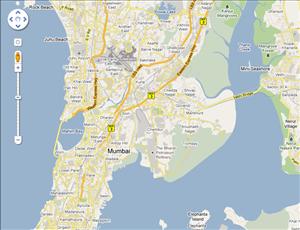Why are we always so gullible as a nation ? Google + LUMS start Street-Mapping Lahore
This is pretext to map sites where PAKISTAN’S NUCLEAR WEAPONS AND BALLISTIC DEVICES are deployed. All Western Companies, NGOs, Churches and Missionaries are arms of Department of Defense in collecting information about strategic locations of Pakistan’s Strategic Weapons Deployment. Little do they know under what shell the real Mccoy is deployed. They can end-up in a wild goose chase also. Radiation emanating from a nuclear device has no different finger prints than stored radioactive materials. The all emit powerful Gamma Rays and neutrons.

Would this not make the task even easier for the RAW, CIA and Pentagon agents? Planning missions and attacks while sitting in the cozy living rooms of their homes in USA / India ???
Why are we, as a nation, always so gullible ?
Mind you, India has refused to allow Google to do Street-Mapping of India’s “sensitive zones”
– MAK
Mapping Pakistan: LUMS and Google launch Tech for People Initiative
LAHORE: April 19, 2012
” An MoU has been signed with the Punjab govt which will bring street views of some regions in the province,” Google Public Policy and Government Affairs senior analyst William Fitzgerald. GRAPHIC:SHEHREZAD MAHER
“A Memorandum of Understanding (MoU) has been signed with the Punjab government which will bring street views of some regions in the province. Google is committed to helping Pakistan progress,” said Google’s Public Policy and Government Affairs senior analyst William Fitzgerald while launching Technology for People Initiative (TPI) at the Lahore University of Management Sciences (LUMS) on Wednesday.
Under the umbrella of the LUMS Research Initiative on Internet and Society, which was launched last week, the TPI is a joint venture between LUMS and Google. According to Fitzgerald, TPI has received Rs10 million funding from Google (what a whopper or a funding). Fitzgerald said the funding aimed to create collaborations and assist in implementation of projects. “We have also worked with the Army and helped disaster management efforts especially during the floods,” he said.
LUMS School of Science & Engineering Dean Dr Sohail Qureshi said he was looking forward to the partnership with LUMS. Department Chair Dr Sohaib Khan said the focus in TPI would be on research and development projects. He said there were many areas especially in the health and education sectors where such initiatives could help in monitoring.
Vice Chancellor Dr Adil Najam said, “We want to talk about innovation and how we can make it real for Pakistan.” He said technology had empowered people by bridging physical distances and connecting them digitally. Dr Najam said in collaboration with Google, LUMS hoped to connect people and make innovation relevant to society.
Indian Police to Google Street View: Stop Filming
GOOGLE MUST OBTAIN THE PROPER SECURITY CLEARANCE TO CONTINUE
Associated Press
Jun 21, 201
Police in southern India have halted Google from taking pictures of streets for its popular Street View services until it gets approval from the federal government. The Mountain View, California-based company will be allowed to resume filming only after it produced security clearances from the Home Ministry and Ministry of Defense, a police official said today.
India is especially sensitive to detailed photographs and locations of key buildings being made public since the 2008 Mumbai attacks where 10 armed gunmen rampaged through iconic city landmarks including two five-star hotels and a Jewish center killing 166 people. Street View has raised privacy concerns in many countries, like Switzerland.
Google Street View cameras halted in India
21 June 2011
Google has suspended filming with Street View cameras in India. Photograph: Daniel Mihailescu/AFP/Getty Images
Google’s now infamous Street View camera cars only set to work on the streets of Bangalore last month, but already Indian authorities have ordered Google to suspend taking images because it has not secured the necessary security clearance.
Google has said that after Bangalore, it plans to map all major cities in India – the 27th country in which the firm plans to launch Street View. As well as cars, Google had been using some tricycles with Street View’s chunky camera equipment attached. Local police were concerned that Bangalore has several military institutions, and a statement given by Google to the AFP confirmed that Google had suspended the operation following a letter from Bangalore’s police commissioner.
Street View concerns in developing countries are significantly different to obstacles Google has hit recently in Germany and Switzerland, which were about privacy and data retention. Street View Brazil reportedly snapped dead bodies, while in India there are also sensitivities in the wake of the Mumbai attacks and from several bombings in Bangalore itself.
Germans to Google Street View: Nein!
MORE THAN A MILLION COULD OPT OUT AS SERVICE LAUNCHES NATIONWIDE
Oct 22, 2010
When Google Street View launches in Germany at year-end, at least 3% of the homes in the country’s 20 biggest cities will look pretty darn fuzzy—intentionally. Some 244,000 of the 8.5 million German households located there have requested that their homes be blurred out before the launch, the Wall Street Journal reports, and that number could soon climb once the rest of Germany is included.
A data-protection official in Hamburg said he expected more than a million homes to request blurring. Google says there may be a few glitches at first, leaving some households briefly visible despite their request. But the firm remains “confident,” according to a spokeswoman, who noted that the number of opt-out applications shows most Germans are willing to have their homes appear.
Google fined $25,000 for US street data collection
WASHINGTON, Mon Apr 16 2012,
Google Inc faces a $25,000 fine for impeding a US investigation into the Web search leader’s data collection for its Street View project, which allows users to see street level images when they map a location. The Federal Communications Commission said the company had collected personal information without permission, and cited evidence that Google had deliberately refused to cooperate with the agency.
Google refused to identify any employees or produce any e-mails. The company could not supply compliant declarations without identifying employees it preferred not to identify, according to an FCC order dated April 13.
Misconduct of this nature threatens to compromise the commission’s ability to effectively investigate possible violations of the Communications Act and the commission’s rules.
Google could not be reached for comment. Between May 2007 and May 2010, Google collected data from wifi networks throughout the United States and throughout the world as part of the Street View project, which gives users of Google Map and Google Earth the ability to view street level images of structures and land adjacent to roads and highways.
However, Google collected passwords, Internet usage history and other highly sensitive personal data that was not needed for its location database project, the FCC said. Google publicly acknowledged in May 2010 that it had collected the so-called payload data, leading to an FCC investigation on whether it had violated the Communications Act.






